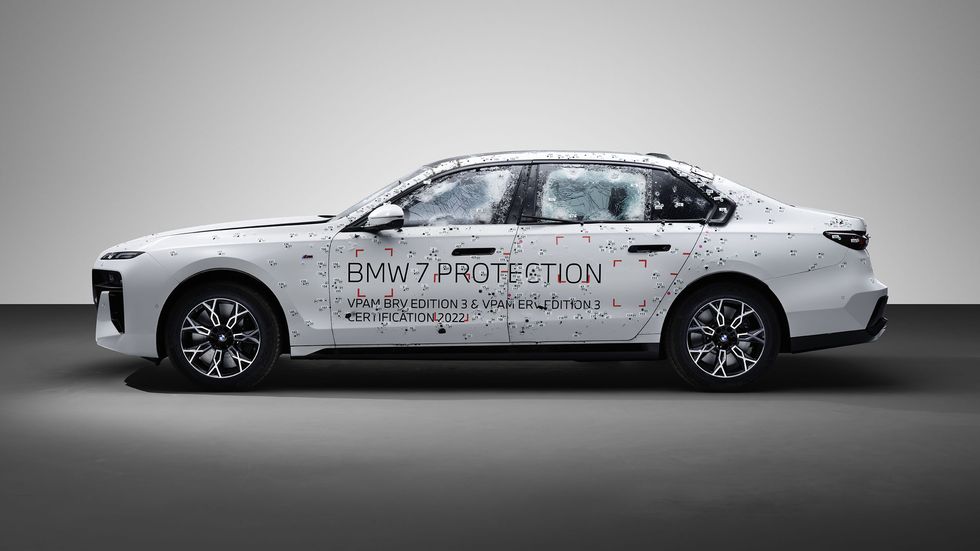- BMW reveals i7 Protection, featuring the VR 9 level of ballistic armor and glass, and becoming the first armored EV sedan from a major automaker.
- The armored i7 features a dual-motor layout, good for 544 hp and 549 lb-ft of torque, but its acceleration is notably slower, requiring 9.0 seconds to reach 62 mph from a standstill.
- The i7 and the gas-engined 7-Series were engineered from the start to offer an armored variant, making the build process easier for the automaker.
As promised last year, BMW took the wraps off the armored version of the electric i7 sedan, thereby landing the first entry in this category from any automaker. Dubbed the i7 Protection, this armored variant of the i7 corresponds to the VR 9 level of ballistic rating, able to shrug off most assault rifle rounds.
Unlike in the past, the 7-Series and the i7 were designed with the armored variant in mind right from the start, instead of having to work backwards after engineering the standard version of the car.
As you might expect, the i7 Protection features a dual-motor layout, good for 544 hp and 549 lb-ft of torque. But given the weight of the car, which BMW isn’t disclosing at the moment, a 0-to-62 mph sprint will require 9.0 seconds, so the BMW won’t be making too quick of a getaway in case of an attack.
“With the new BMW Protection Core, the entire supporting structure for the protection saloon’s body is constructed from armor steel for the first time,” the automaker notes. “The BMW Protection Core forms a self-supporting protective cell, which is then combined with protection-spec doors, armoring for the underbody and roof, and safety glass.”
BMW plans to offer two protection levels in this i7: VR 9 and VPAM 10, with the latter featuring a heightened level of armor. But both models will feature ballistic glass that corresponds to VPAM 10, which is pretty impressive in the industry at the moment.
In other words, BMW isn’t even bothering with ballistic glass levels below VPAM 7—that’s how much protection the customer base of armored 7-Series cars needs now.
Among other systems, the armored i7 sedans will wear Michelin PAX run-flat tires, which will allow the sedan to keep moving at up to 50 mph even in the case of serious punctures.
Perhaps it’s not too early to say that we’re now firmly in the age of drone-borne threats rather than the classic assault rifle attacks on motorcades, which at one point were the main mode of threat against armored sedans and SUVs. These days sophisticated attackers will know the target’s car is armored and may not even bother with small arms.
But drones are now cheap and can carry several pounds of explosives, simply landing on the roof of a car in traffic.
BMW hasn’t been asleep at the wheel when it comes to drone threats.
“The special armoring for the roof and underbody has been designed to offer maximum protection against explosives in particular,” the automaker notes. “The occupants are also protected from drone attacks with explosive charges and from fragments dispersed by hand grenades on detonation.”
BMW’s statement regarding drones doesn’t apply to all drone types carrying all types of explosives, of course. Those who expect such an attack will also be using electronic countermeasures on an escort vehicle to jam drones, so the armored material in the roof won’t be the first line of defense. At least in theory.
When it comes to just who will order one, we anticipate a few western European heads of state may opt for the i7 once deliveries begin later this year.
But elsewhere in the world, the i7 may be a tougher sell as a result of continued skepticism from industry customers toward EV batteries, and their potential for thermal events in case of a sophisticated attack from below.
The issue of range may also play a role in the popularity of the electric version of the armored sedan, as such cars sometimes see long hours of use per day, and will cover a couple of hundred miles a day, and need to have a lot of range in reserve for unplanned trips. BMW says the i7 Protection will consume 30.0 kWh/100 km, which with a 101.7-kWh (usable) battery translates to just over 200 miles in the WLTP cycle.
That’s why BMW will continue to offer armored versions of the 7-Series alongside the i7, with 4.4-liter V8s underhood.
Should BMW offer armored versions of its 7-Series cars in the US, like it does in Europe and elsewhere? Let us know what you think.

Jay Ramey grew up around very strange European cars, and instead of seeking out something reliable and comfortable for his own personal use he has been drawn to the more adventurous side of the dependability spectrum. Despite being followed around by French cars for the past decade, he has somehow been able to avoid Citroën ownership, judging them too commonplace, and is currently looking at cars from the former Czechoslovakia. Jay has been with Autoweek since 2013.
Read the full article here



